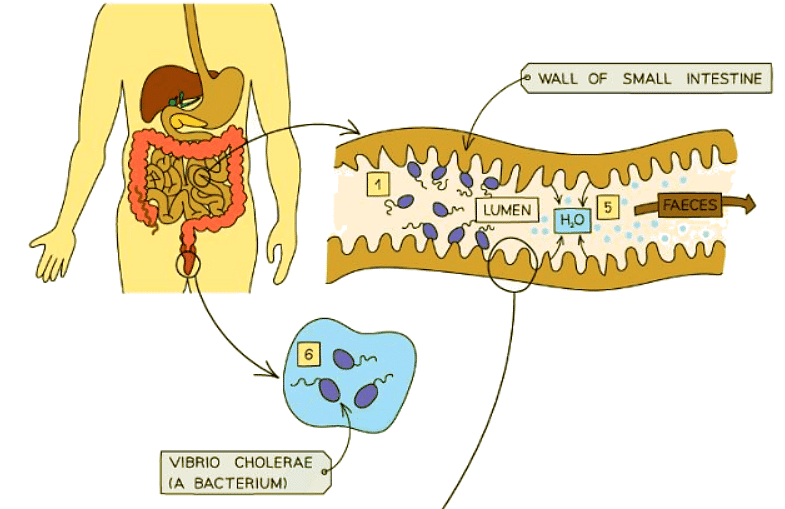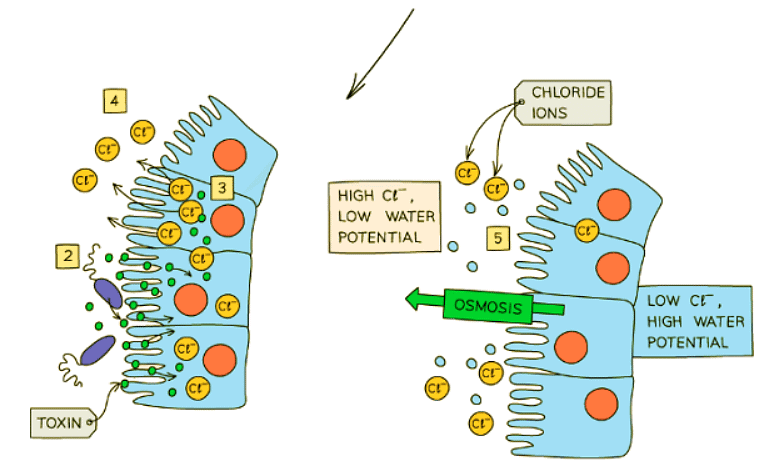Class 10 Exam > Class 10 Notes > Biology for GCSE/IGCSE > Cholera
Cholera | Biology for GCSE/IGCSE - Class 10 PDF Download
Cholera causes diarrhoea
- Diarrhea: Diarrhea refers to the passing of loose or watery stools from the anus.
- Severity and Fatality: If diarrhea is severe and prolonged, it can result in death due to excessive fluid loss.
- Dehydration Effects: Severe diarrhea can lead to significant loss of water and essential ions from the body, disrupting the normal functioning of tissues and organs.
- Treatment with ORT: Oral rehydration therapy (ORT) is an effective method to manage cholera by replenishing lost fluids and electrolytes.
- ORT Composition: ORT typically consists of a solution containing a precise balance of salt and sugar dissolved in water.
- Causes of Diarrhea: Various factors can cause diarrhea, including infections such as Vibrio cholerae bacteria, the pathogen responsible for cholera.
How does Vibrio cholerae cause diarrhoea?


How Cholera Leads to Diarrhoea
Ingestion: Cholera is contracted by ingesting contaminated water or food. When the bacteria enter the small intestine, it triggers the following illness:
- Bacterial Attachment: The bacteria attach themselves to the wall of the small intestine.
- Toxin Production: They produce a harmful toxin.
- Stimulation of Cells: The toxin stimulates the cells lining the intestine to release chloride ions into the intestine's lumen.
- Chloride Ion Accumulation: Chloride ions accumulate in the intestine's lumen, reducing its water potential.
- Water Movement: When the water potential in the intestine is lower than that of the cells, water moves out of the cells into the intestine through osmosis.
- Fluid Loss: This leads to a significant loss of water from the body in the form of watery feces.
- Imbalance in Blood: The blood ends up with lower levels of chloride ions and water.
Question for CholeraTry yourself: How does cholera cause diarrhea?View Solution
The document Cholera | Biology for GCSE/IGCSE - Class 10 is a part of the Class 10 Course Biology for GCSE/IGCSE.
All you need of Class 10 at this link: Class 10
|
101 videos|193 docs|33 tests
|
FAQs on Cholera - Biology for GCSE/IGCSE - Class 10
| 1. What are the common symptoms of cholera? |  |
Ans. Common symptoms of cholera include severe diarrhoea, vomiting, and dehydration.
| 2. How is cholera transmitted? |  |
Ans. Cholera is transmitted through ingesting contaminated food or water, usually in areas with poor sanitation and hygiene practices.
| 3. Can cholera be prevented? |  |
Ans. Cholera can be prevented by ensuring access to clean water, practicing good hygiene, and getting vaccinated in high-risk areas.
| 4. How is cholera treated? |  |
Ans. Cholera is treated with rehydration therapy, which involves replacing lost fluids and electrolytes. Antibiotics may also be prescribed in severe cases.
| 5. Is cholera a common disease worldwide? |  |
Ans. Cholera is still a prevalent disease in many developing countries, especially in areas with inadequate sanitation and access to clean water.
Related Searches















